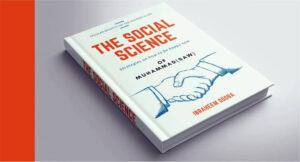How a single word from a book sparked a viral video, conversions among young Americans, and empathy for Palestinians, by Ibrahim Dooba
As international students, we shared a hostel with Riyad, my Palestinian friend. Riyad and I, unlike our peers, scraped by without scholarships or sponsorships for our master’s degrees in psychology.
Riyad was older and saw me as both a younger brother and a friend. He would humbly say we learned from each other, but he was truly my mentor.
His response to adversity left a deep impression on me: he approached hardship with gratitude.
When faced with difficulties, he would say: “Alhamdulillah,” meaning “All praise is due to Allah.”
For instance, his friend Owais, a doctor and our benefactor, was battling cancer. Riyad prayed for him daily, urging me to do the same.
“Ibraheem,” he would say, “please pray for my friend.”
When we lost Owais, Riyad simply said, “Alhamdulillah.”
This expression has touched many in the West, especially as Palestinians in Gaza, amidst the devastation of Israeli bombings, echo it while mourning.
Observers are perplexed by their gratitude despite daily casualties. As of December 5, 2023, 20,000 have died, predominantly women and children.
READ ALSO: Orthopraxy: Cultivating compassion beyond rote rituals, by Osmund Agbo
I mistook this trait as unique to Riyad’s faith, prompting me to adopt it myself. Yet, Gaza’s resilience shows it’s a broader Palestinian characteristic, deeply rooted in Islam.
This mindset has likely shielded many Palestinians from despair under a 75-year occupation.
Barbara Fredrickson’s research at the University of Michigan revealed that positive emotions during crises, such as the September 11th attacks, foster resilience and protect against depression. Matt Higgins echoes this in “Burn the Boats,” highlighting the value of optimism.
However, the link between science and Palestinian resilience is often overlooked, with many attributing their strength solely to the Qur’an—a book that captivates its readers.
It’s the reason Islamic preachers encourage the curious to read the Qur’an, promising transparency.
This has led Westerners to the Qur’an, with some converting to Islam.
A viral video shows Westerners marvelling at the reaction of the Palestinians after losing their loved ones. The video, among others, shows a woman, a sea of debris behind her, saying “Alhamdulillah” after being told she lost her son.
A white woman in the video says “I’m Jewish, I lost family in the holocaust and I feel comfortable saying that what Palestinians are facing is another holocaust.”
Also, the UK Guardian reported on young Americans drawn to the Qur’an inspired by Gazan resilience. Megan B. Rice praised the Palestinians’ unshakeable faith, while Nefertari Moonn found the Qur’an’s passages deeply moving.
“I wanted to talk about the faith of Palestinian people,” Megan Rice said, “how it’s so strong, and they still find room to make it a priority to thank God, even when they have everything taken away from them.”
Rice added: “I saw mothers clutching their dead babies and thanking God.”
Another American lady, Nefertari Moonn, a 35-year-old from Florida, did the same thing: “I wanted to see what it was that made people call out to Allah when they stared death in the face,” she said. “Seeing passage after passage resonated with me. I began to have such an emotional attachment to it.”
In my book, “The Social Science of Muhammad” (may Allah’s peace be upon him) I cited at least seven benefits of gratitude from the scientific literature drawing on the works of scholars such as Robert Emmons.

In the book, I mentioned how Muslims say “Alhamdulillah” at least 17 times a day during their prayers.
A very important verse from the Qur’an says:
“If you’re grateful, I will surely give you more and more.” Surah Ibrahim, verse seven.
We recognise gratitude in joy, but its importance in adversity is profound. Islam teaches that believers are rewarded for every hardship endured, framing trials as opportunities for divine reward.
This outlook, as shown by Palestinians and supported by science, underpins their indomitable spirit.
Whether you’re a Muslim, non-Muslim or nonbeliever, if you’re going to take one insight from the Qur’an it should be this word: Alhamdulillah.
Disclaimer
The opinions and views expressed in this article belong solely to the original author and other contributors. They do not necessarily reflect the official policy or opinions of Neptune Prime.
Follow the Neptune Prime channel on WhatsApp: https://whatsapp.com/channel/0029Va74ZvU2v1IqKByXoX3d
Do you have breaking news, interview request, opinion, suggestion, or want your event covered? Email us at neptuneprime2233@gmail.com


